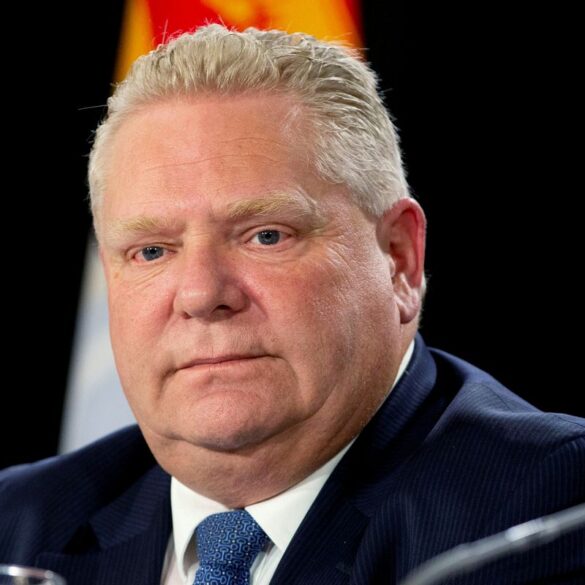
Ontario Premier Doug Ford is seen after a meeting with Canada’s provincial premiers in Toronto, Ontario, Canada December 2, 2019. REUTERS/Carlos Osorio/File Photo
The commissioner presiding over the public inquiry into the use of the Emergencies Act has filed court documents suggesting Ontario Premier Doug Ford has overstated the extent of the privilege he has as a politician in order to avoid testifying.
A federal court will hear both sides in the dispute on Nov. 1.
Justice Paul Rouleau, the commissioner tasked with making recommendations regarding the federal government’s invocation of the Emergencies Act, filed court documents Oct. 31 in response to Ford’s reluctance to be a witness at the inquiry.
Rouleau wrote in the court documents that “there is no blanket privilege to decline to testify.”
“Being required to testify before a commission of inquiry does not constitute irreparable harm,” Rouleau said. He said it has “never been established” that parliamentary privilege can be used at an inquiry and that he is “legally entitled” to evidence under its parliamentary mandate, even from a premier.
After refusing to cooperate voluntarily for weeks, Ontario Premier Doug Ford was issued a summons to testify before Rouleau as part of the mandatory public hearing required whenever the Emergencies Act is invoked.
“In the circumstances of this case, it is apparent that the applicants are seeking to use a principle with uncertain application to the commissioner’s summonses to delay their testimony until after the commission’s mandate has expired,” Rouleau said.
‘Irreparable Harm’
Ford was one of the few premiers who expressed support for Trudeau’s decision to use the extraordinary powers granted by the Emergencies Act. Alberta, Saskatchewan, Manitoba, Quebec, Nova Scotia, New Brunswick, and Prince Edward Island were not in agreement.
Ford used Ontario’s emergency law on Feb. 11, even before the federal government invoked the Emergencies Act to quell the Freedom Convoy protests.
A few days prior on Feb. 8, Prime Minister Justin Trudeau, in a phone call with Ottawa Mayor Jim Watson, had said Ford was avoiding clearing the protests and said he was “hiding from his responsibility on it for political reasons.”
The inquiry has heard testimony that the Ontario provincial government refused to meet with the Ottawa mayor and the federal government.
The commissioner said multiple individuals testifying have mentioned Ford and Jones and their “participation or lack thereof in the events leading up to the declaration of emergency” and said he has questions about this.
Ford argued parliamentary privilege should prevent him, as well as Sylvia Jones, former Ontario solicitor general, from testifying. Ford filed an appeal against the summons on Oct. 25, stating his testimony could cause “irreparable harm.” He argued he had parliamentary privilege, which is legal immunity designed to protect politicians from “undue interference” in their duties.
Parliamentary privilege is a centuries-old concept, first established when the English House of Commons needed protection from the power and interference of the ruling monarch. It is intended to provide freedom of speech for politicians while Parliament is in session, and prevent them from being brought to court in civil actions.
Ultimately, it is a court that has the jurisdiction to determine the limit, existence, and scope of that privilege.
Omid Ghoreishi and The Canadian Press contributed to this report.
